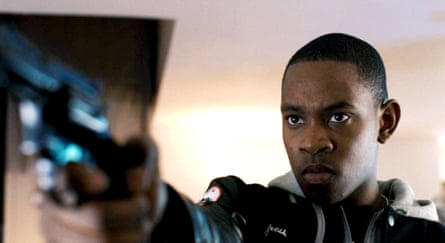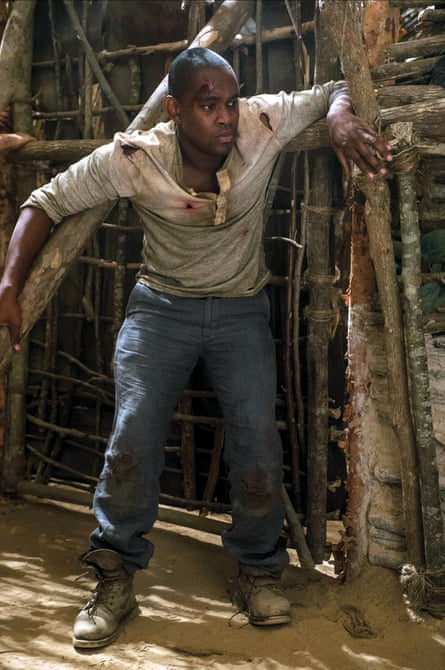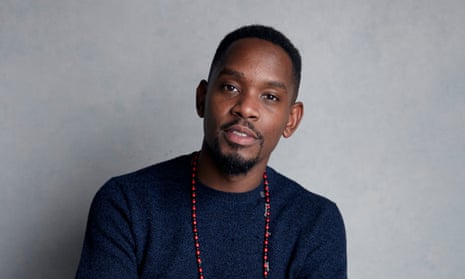Aml Ameen has one of those big, light-the-room smiles – and he deploys it freely, even to those physically impervious to his charm. When I join the video call, he is asking Alexa, very nicely, to turn down the music.
Ameen is at home in Los Angeles (to where he moved from London a decade or so ago). He has been acting professionally since he was six and now he has co-written, directed and starred in a romcom, Boxing Day. It is an irresistibly Christmassy London movie in the tradition of Love Actually (a film that he adores). It is also the UK’s first Christmas-set romantic comedy led by a Black cast.
Ameen grew up watching old movies with his mother – anything with Katharine Hepburn, Jimmy Stewart or Cary Grant. His sensibilities lean towards stories about love, family and friendship. But you wouldn’t necessarily know that from his films. “I do a lot of leading roles. But I’ve never played anything close to home. Even if you go back to Trife in Kidulthood. That’s not my life or how I grew up.”
Kidulthood, the gritty 2006 film in which he played a teenager dicing with trouble in west London, was his breakthrough. Since moving to the US, he has appeared in David E Kelley’s legal series Harry’s Law, the young adult sci-fi movie The Maze Runner and the Wachowski sisters’ Netflix series Sense8. He played D, a Jamaican gangster, in Idris Elba’s British drama Yardie.
With Boxing Day, Ameen wanted to reveal more of himself as an actor, he says: “To amplify another side of myself and the characters in my real life. It’s a love letter to them and to British culture.” The film is semi-autobiographical, a fictionalised version of his family’s Boxing Day parties: big get-togethers in London with aunties, cousins, friends and friends of friends. He plays Melvin, a writer who, with his gorgeous American girlfriend, Lisa (Aja Naomi King), flies in from LA for Christmas. The plan is to introduce her to his Caribbean British family on Boxing Day. What he has omitted to tell her is that his ex is a famous pop star (played by Little Mix’s Leigh-Anne Pinnock).
Ameen says he put a bit of himself in the character, but as a comic device he wrote Melvin as a bolter. “He runs a lot, but I’m confrontational. I’m happy to confront an issue.”
He wanted to show a side of British life that we don’t see in the cinema. “If the world stopped tomorrow, what were Black British people like? If we only had movies to go on, it’s very narrow. I’m adding my stroke of the brush.
“Everything is British culture that is in the country, right? Whether it’s Bend It Like Beckham, or Top Boy, or Richard Curtis and the wonderful films he’s done.” Ameen loves the fact that Boxing Day is the first all-Black Christmas romcom in the UK. “But, more than that, it’s a universal film.”
It is universal. Still, I tell him some of my favourite scenes are specific to Black British culture. Marianne Jean-Baptiste gives a stunning performance as Melvin’s mum, Shirley, whose new boyfriend is white. She makes a speech where she explains to him why she can’t bring herself to introduce him to her kids. She talks about her challenges as a parent, raising her Black children to “take pride in what they saw in the mirror”.
It is incredibly moving, I tell Ameen, who looks bashful. “Thank you so much, honestly. One of the most amazing things about finally being able to write and direct is to express things that I’ve thought or written over the years.” Growing up around women of colour, these were anxieties he witnessed when they started interracial relationships. “One of the things I’ve heard that happens is that sense: ‘Do I feel like I’m betraying my culture? Do I feel like I’m betraying my family?’” he says.

Ameen grew up in London – one of eight siblings, the oldest from his parents’ marriage. He gets his forceful belief in himself – and a hardcore work ethic – from them, he says. His British Jamaican mother looked after the kids when they were little and later trained as a psychologist; she now practises as a relationship therapist.
Ameen is stumped for a moment when he tries to describe his father. It’s funny talking about my dad,” he says, his arms gesturing the impossibility of putting it into words. “He’s a jack of all trades. He was a massive leader in the borough of Hackney.” His dad, who was born in St Vincent, is an immigration lawyer and businessman. He established a college for Caribbeans in London and organised youth exchanges around the world. As a kid, Ameen tagged along: “I was exposed to a lot of the world. That informs a lot of who I am.”
After a pause, he has it: “You know, if I was to characterise my dad, he’s like that golden immigrant, who lifts up a country a little bit. When you’re an immigrant to a country, like I’m an immigrant to America, you get that sense: ‘I must do this. There’s no going back.’ You know what I mean?

Ameen made his first TV appearance at six, on Floella Benjamin’s kids’ show Hullabaloo, then went to the same stage school as Naomi Campbell and Amma Asante and performed in the West End musicals Oliver! and Jolson.
He was on stage with Michael Jackson at the Brit awards when Jarvis Cocker invaded the stage and waggled his bum. This was 1996; Ameen, who was 11, had been picked to play one of the sad-faced suffering children to Jackson’s messiah. After the incident, kids who had been hurt in the commotion were whisked off to Hamleys in Brent Cross by Jackson’s team. “I tried to fib,” Ameen recalls, but he didn’t have it in him to pretend that he had been injured.
As a teenager, he was “crazy ambitious”: head boy and “star” of his stage school. “I was a corrupt head boy,” he grins. “If you gave me Softmints when you were late, we were good.” At home, things weren’t so great. His parents divorced when he was 15 and his comfortable life was pulled out from underneath him. “We moved around a lot for a little bit. That was quite challenging for me. I hated poverty.” He left their four-bedroom house and moved into a small flat with his mum. It defined him as a teenager: “I was 15 and I was like: you know what? I’m going to make my own way, my own money, my own thing.”
At 20, he had a cracking year: Kidulthood came out of nowhere, kickstarting a new generation of British teen movies. At the same time, Ameen landed a role in The Bill. His best friend told him he would be mad ever to leave the series. But he had other ideas. “I agreed with my agent that I’d do 18 months and bounce, because I was very clear I had to go to America.” The lack of diverse roles in Britain has been a motivator for other Black British actors – including David Harewood and David Oyelowo – to move to the US. But Hollywood has always been Ameen’s “beacon”. That said, the talent drain is a reality. “You’ve just got to look at the math. We don’t have Idris Elba without Idris going to America and doing The Wire – and then coming home and going to Luther,” he says.
Directing Boxing Day has made him more picky as an actor. He is nearly finished playing Martin Luther King in a biopic about the gay civil rights activist Bayard Rustin, who organised the 1963 March on Washington. He has done the “I have a dream” speech, which is protected by copyright and therefore isn’t usually portrayed in movies. “Before I went on, Chris Rock [his co-star] was like: ‘This is the first time anybody has been allowed to say Martin’s words on screen. No pressure!’” But if anyone can deal with the baggage of playing an icon, my money is on Ameen. He describes his acting style as “accidentally method”: “I literally lean energetically towards whichever character I’m playing.”

Last year, he appeared in Michaela Coel’s I May Destroy You, playing Arabella’s friend Simon, a city banker. Coel knew his younger brother from the spoken word scene and they clicked: “Me and Michaela, we caught a good vibe.” He identified in her series what he wanted to do with Boxing Day, broadening the view of Black British life. “I think Michaela really blew it out of the water from a global standpoint. That’s the first time people had seen Black British people just function in everyday life. I loved that about I May Destroy You.” He puts on a gee-whiz American accent to explain what he is talking about: “Oh, they’ve got, like, Black people in England?”
Is he asked that question in LA? Not any more. “We thank Idris Elba.” He laughs. “Idris Elba and Seal. The only two Black men in England.”
Ameen has lived in LA for more than 10 years. The funny thing is, he talks non-stop about London, I say. “Oh man. I rep my city every day. My cousin says this about me. He’s like: ‘Do you what you are? You’re patriotic abroad.’ He loves London for its multiculturalism. “There’s nowhere, no city that I’ve come across, that [people] live so closely together and are so influenced by each other.”
Would he move back? A pause. “I’m trying to think of a cool answer. But the answer is no. I’ve got a lot of work happening there. I’m there a lot. But no. I love the sun; my beautiful Black skin loves the sun.”
